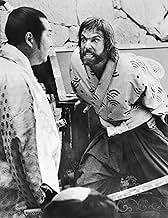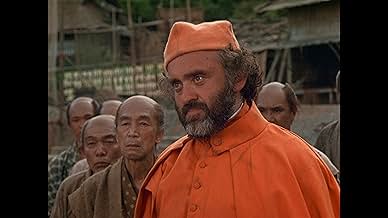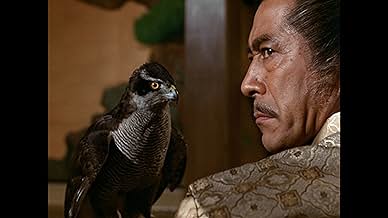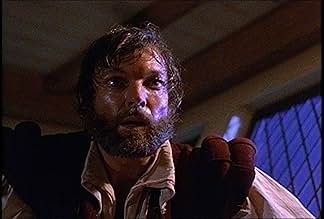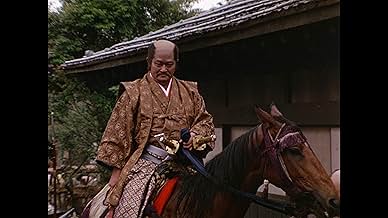Um navegador inglês torna-se um jogador e peão nos jogos políticos complexos no Japão feudal.Um navegador inglês torna-se um jogador e peão nos jogos políticos complexos no Japão feudal.Um navegador inglês torna-se um jogador e peão nos jogos políticos complexos no Japão feudal.
- Ganhou 3 Primetime Emmys
- 8 vitórias e 13 indicações no total
Explorar episódios
Avaliações em destaque
I first saw the mini-series on TV when it came out. I was like millions of other viewers who made sure they were home night after night to see this epic. Now that it's out on DVD, how could I resist? Seeing it on a much bigger screen than existed in the early 80's, I immediately was appalled by the bad hair pieces of almost all of the Japanese actors. It took a while to get used to the seams and wrinkled skullcaps and the makeup that didn't really match. The only other "ouch" moment, for me, came in the opening shot of the "Erasmus" being filmed from a helicopter with Orson Welles narration. It was impressive up until the helicopter shadow goes right over the boat and the water!..... I was amazed that wasn't edited out in post. Ah well. When you watch the bonus material, you get an idea of what a monumentally difficult project this was from the language and custom difficulties to the famous TOHO Studios being about 25 years behind the times with their equipment...not to mention the tank where the shipwreck was filmed. I don't know if I agree with the director and producers that if it wasn't for 'Shogun' sushi would not be as popular in the U.S. as it has become, but it certainly sparked an ongoing interest in Japanese history and culture in me. It will always be one of the crowning achievements for television. It's a miracle that it came off as beautifully as it did. Just don't watch the 2-hour mess that is on video.
Was 11 years old when this was on TV. "Oh you should watch this it's so good," my parents said. So I didn't watch it, of course. Then on Friday night I went in to the bedroom and turned on the set and surfed through the channels to see what was on. Came upon the last episode of Shogun and was transfixed. Yoko Shimada, so beautiful as the character Mariko, captured my young heart, and I was forever in love with Japan. Started reading the book the next day, read EVERYTHING I could get my hands on about Japan, went to Japan as an exchange student, and am now married to a Japanese girl. This is a wonderful story, and Yoko Shimada was the best choice for the part, looking so natural in Kimono. No woman ever showed more grace, except maybe Audrey Hepburn...
The MiniSeries Shogun is my all time favorite program. It is a romantisied account of the adventures of the first Englishman to reach Japan. The main character John Blackthorne is based on the real life person William Adams who was the only non Japanese ever to become a samurai. He was also a feudal lord in Japan ( called a Daimyo ) and the first Admiral of the Japanese Navy.
The acting is excellent and something which I found interesting and unusual about this series is that one of the ways that the movie uses to put you into the mind of the main character is that as he doesn't know any Japanese when he arrives there are no subtitles when the characters are speaking Japanese.
As I said earlier my all time favorite program and one I wish could be seen by more people more often. I did buy the series.
The acting is excellent and something which I found interesting and unusual about this series is that one of the ways that the movie uses to put you into the mind of the main character is that as he doesn't know any Japanese when he arrives there are no subtitles when the characters are speaking Japanese.
As I said earlier my all time favorite program and one I wish could be seen by more people more often. I did buy the series.
There was a time in TV when the mini-series was king. They were great prestige products for the networks who, risking immense financial expenditure, hoped to create a cinematic masterpiece on a small screen.
SHOGUN may be the ultimate expression of this neglected TV format. Based on James Clavell's sweeping epic novel of the same name, it succeeds fully in transporting the viewer to another time and place. Through John Blackthorne's eyes (Richard Chamberlain in a now iconic performance, blending moments of delightful scenery chewing with moments of genuine emotion and subtlety), we become ever more involved in the political dealings of the Japanese nobility and the mixed motives of the Jesuits.
One of the great triumphs of SHOGUN is to ensnare the viewer despite long segments in Japanese with no subtitles. The filmmakers were trying to tell the story through Blackthorne's eyes and save for a few moments of narration explaining the dialog, we are left to slowly comprehend the action at the same pace as Blackthorne. It's a device which works wonderfully well, leaving the viewer to figure out what's going on through context and character.
In addition to Chamberlain, SHOGUN is replete with glorious performances. Toshiro Mifune's Toranaga, a Japanese nobleman with grand political designs, possesses great power and yet Mifune's performance is also very nuanced. Toranaga is a man who's mind is always trying to figure three steps ahead and we see this aspect of Toranaga's personality in Mifune's work- a considerable feat considering his dialog is exclusively in Japanese and without subtitles.
Yoko Shimada plays Mariko with a captivating beauty and ethereal grace. Becoming Blackthorne's interpreter and love interest, we cannot take our eyes off of her. Her performance is made doubly impressive by the fact that Ms. Shimada spoke no English and had to be told what her lines met with great care.
Additionally, John-Rhys Davies gives a wonderfully bravura turn as Rodrigues and Damien Thomas gives his Father Alvito real depth and dignity.
SHOGUN does show its age. The quality of the video image does have a bit of that TV glow to it and Maurice Jarre's score, seeming so lush back in 1980, sounds as if it were recorded by a very small third-rate band in a backwater recording studio- it reeks of TV. Still, these are comparatively minor quibbles to an otherwise completely engrossing epic. SHOGUN succeeds mightily in taking the viewer into a strange land filled with wonder and intrigue. By the end, it's a land you aren't ready to leave- perhaps the ultimate compliment for any film.
SHOGUN may be the ultimate expression of this neglected TV format. Based on James Clavell's sweeping epic novel of the same name, it succeeds fully in transporting the viewer to another time and place. Through John Blackthorne's eyes (Richard Chamberlain in a now iconic performance, blending moments of delightful scenery chewing with moments of genuine emotion and subtlety), we become ever more involved in the political dealings of the Japanese nobility and the mixed motives of the Jesuits.
One of the great triumphs of SHOGUN is to ensnare the viewer despite long segments in Japanese with no subtitles. The filmmakers were trying to tell the story through Blackthorne's eyes and save for a few moments of narration explaining the dialog, we are left to slowly comprehend the action at the same pace as Blackthorne. It's a device which works wonderfully well, leaving the viewer to figure out what's going on through context and character.
In addition to Chamberlain, SHOGUN is replete with glorious performances. Toshiro Mifune's Toranaga, a Japanese nobleman with grand political designs, possesses great power and yet Mifune's performance is also very nuanced. Toranaga is a man who's mind is always trying to figure three steps ahead and we see this aspect of Toranaga's personality in Mifune's work- a considerable feat considering his dialog is exclusively in Japanese and without subtitles.
Yoko Shimada plays Mariko with a captivating beauty and ethereal grace. Becoming Blackthorne's interpreter and love interest, we cannot take our eyes off of her. Her performance is made doubly impressive by the fact that Ms. Shimada spoke no English and had to be told what her lines met with great care.
Additionally, John-Rhys Davies gives a wonderfully bravura turn as Rodrigues and Damien Thomas gives his Father Alvito real depth and dignity.
SHOGUN does show its age. The quality of the video image does have a bit of that TV glow to it and Maurice Jarre's score, seeming so lush back in 1980, sounds as if it were recorded by a very small third-rate band in a backwater recording studio- it reeks of TV. Still, these are comparatively minor quibbles to an otherwise completely engrossing epic. SHOGUN succeeds mightily in taking the viewer into a strange land filled with wonder and intrigue. By the end, it's a land you aren't ready to leave- perhaps the ultimate compliment for any film.
Without a doubt, this is the best American movie about the Orient that has been ever made. Nothing we Americans will do will ever surpass this. Next to Akira Kurosawa's amazing works, there is Shogun. Shogun is in excellent company.
Do NOT see the shortened version, see all of it. The multi tape version is great; and the single tape mini version is a travesty.
Do NOT see the shortened version, see all of it. The multi tape version is great; and the single tape mini version is a travesty.
Você sabia?
- CuriosidadesWill Adams, the real-life English sea captain and adventurer who made it to Japan in the 16th century, has a street named after him in Japan: Anjin-Cho.
- Erros de gravaçãoAnjin-san receives a flintlock pistol as a gift from Lord Toranaga. Flintlock pistols were not in wide use until 1630, thirty years after the show's setting. The wheel lock and match lock pistols and muskets, also used in the show, are correct. Additionally, the Europeans were reluctant to export the latest firearms to Japan, preferring to keep the superior weaponry to themselves.
- Citações
[after Blackthorne's guard prevented an assassination attempt by Rodrigues]
Pilot-Major John Blackthorne: Captain Yoshinaka was right to search him. Was that your idea?
Lady Toda Buntaro - Mariko: Please excuse me, but I was afraid for you.
Pilot-Major John Blackthorne: Sad, isn't it? Not being able to trust anyone.
Lady Toda Buntaro - Mariko: It is not sad, Anjin-san. It is just one of life's most important rules.
- Versões alternativasOriginally a twelve-hour TV miniseries narrated by Orson Welles, it was later reissued for television in a somewhat shortened version with narration by Anne Bancroft. Shogun was re-edited into a 125-minutes movie for USA network TV with the addition of a new voice over narrated by Orson Welles
- Trilhas sonorasBLACKTHORNE'S SHANTY
Words and Music by Eric Bercovici
Principais escolhas
Faça login para avaliar e ver a lista de recomendações personalizadas
- How many seasons does Shogun have?Fornecido pela Alexa
Detalhes
- Data de lançamento
- Países de origem
- Idiomas
- Também conhecido como
- James Clavell's Shogun
- Locações de filme
- Empresas de produção
- Consulte mais créditos da empresa na IMDbPro
Contribua para esta página
Sugerir uma alteração ou adicionar conteúdo ausente


